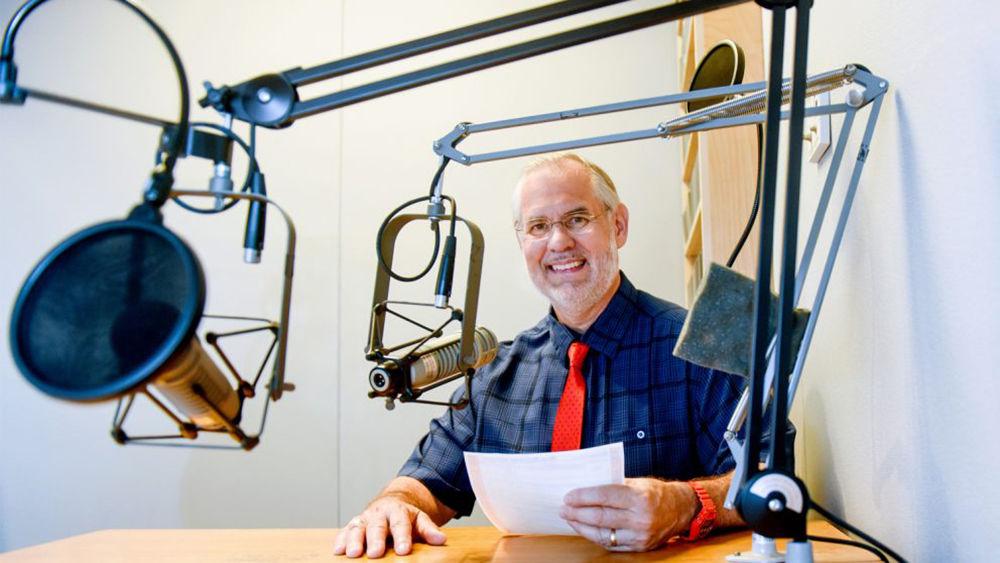
Courtesy of the N.C. State College of Agriculture and Life Sciences
Mike Walden, a distinguished professor of Agricultural and Resource Economics, is a significant frontrunner in implementing NC State’s College of Agricultural and Life Sciences (CALS) mission of knowledge extension. “Economic Perspective”, a podcast “derivative” of Walden’s daily radio programs, is Walden’s notable outlet for distributing his knowledge, insights and research to the greater North Carolina community.
As the title suggests, the podcast focuses on relevant, compelling issues and questions, providing provides brief yet extensively insightful commentary stemming from an economic standpoint. The podcast episodes are taken from a much larger collection of Walden’s daily radio programs, which he’s been doing for almost 40 years.
According to Walden, the radio programs themselves are recorded in batches of 10 twice a month, and are sent out by the university to numerous commercial radio stations across the state. The podcasts, on the other hand, are specially selected two-minute recordings that are uploaded onto the NC State CALS webpage.
The episode formats are decidedly straightforward. The openings, currently narrated by Walden’s wife, Mary, relay a quick summary of some collective concern or issue that afflicts the general population. Walden consecutively and insightfully responds with simplified and well-constructed economic prose and detail.
According to Walden, the radio program’s inception can be stretched back to the late 1970s when the now-retired Reese Edwards was NC State’s official radio editor. Walden doesn’t remember who approached who about the idea, but together they wrote, edited and recorded the scripts that Walden initially provided the content for.
Now, the radio programs are produced via NC State’s CALS Communications Services, which also hosts Walden’s “You Decide” news columns. The radio programs are developed specifically with the help of extension video specialist Ken Ellzey, and visual arts specialist Chris Liotta.
According to Liotta, Ellzey manages all of the physical components of the recording and distribution process, as well any associated post-recording edits. Liotta himself is responsible for selecting and uploading the radio programs onto the CALS website through audio outlets such as SoundCloud and Apple. This eventually allowed for the radio programs to take their current podcast form.
The topics Walden focuses on for the podcast come from a variety of sources, including his own reading of economic reports, relevant news topics and even his own research.
“Surprisingly, to do 20 topics a month is really not hard,” Walden said. “Fortunately for me, there’s always a lot of economic issues, a lot of economic information and a lot of economic questions.”
This podcast is a solid reflection of the vast applicability of economics. Among its more recent episodes are “Economic Impacts of the Hurricanes” and “Choosing the Best College.” The former provides a response to concerns about this year’s hurricanes and insightful commentary on what we should expect moving forward, while the latter addresses the economic considerations that go into deciding which college to attend.
“What I really like about Mike’s stuff is [that] he doesn’t take sides,” Liotta said. “If you listen to him, you can’t really figure out where he personally stands on the matter. He presents both sides; the pros and cons.”
Walden jokingly considers his wife his “hardest editor,” describing her as an “inquisitive person” who noticeably seems to raise more questions than his previous partners used to, which he regards as a good thing.
“I’d probably had five or six different partners,” Walden said. “The last partner, she left NC State rather quickly. That was at a time [when] university resources were being reduced in certain areas, so there wasn’t a dedicated person to do [the programs]. My wife happened to retire, so I thought ‘she’s got a great voice, she’s articulate, she’s intelligent.’ I said, ‘would you like to do them,’ and she said ‘I’ll try it,’ and she’s been doing these now, I think, about a decade with me.’”
In response to how being both a professor and a radio host go hand-in-hand, Walden explained how doing radio programs and teaching students — especially undergraduates — actually have a lot in common. According to Walden, each has the potential to reinforce the other.
“Undergraduates come to economics with no background,” Walden said. “I have to be on my toes to explain things that make sense to them in a layperson’s language, without being filled with jargon and complex relationships. That’s obviously what you have to do in a radio program because people are out there listening from all backgrounds, and no one will listen if what I’m saying doesn’t make any sense.”
Despite the wide range of topics Walden covers, not everything he records makes it to the CALS website. This is where Liotta makes his decisions and curates the information that would generate the most buzz.
“There’s a lot that [doesn’t] get posted,” Liotta said. “What I’m doing right now is trying to find a way to incorporate more of the content that passes through. The most important thing is finding content that will resonate with people, and I think Mike does an excellent job of picking subject matters to talk about.”